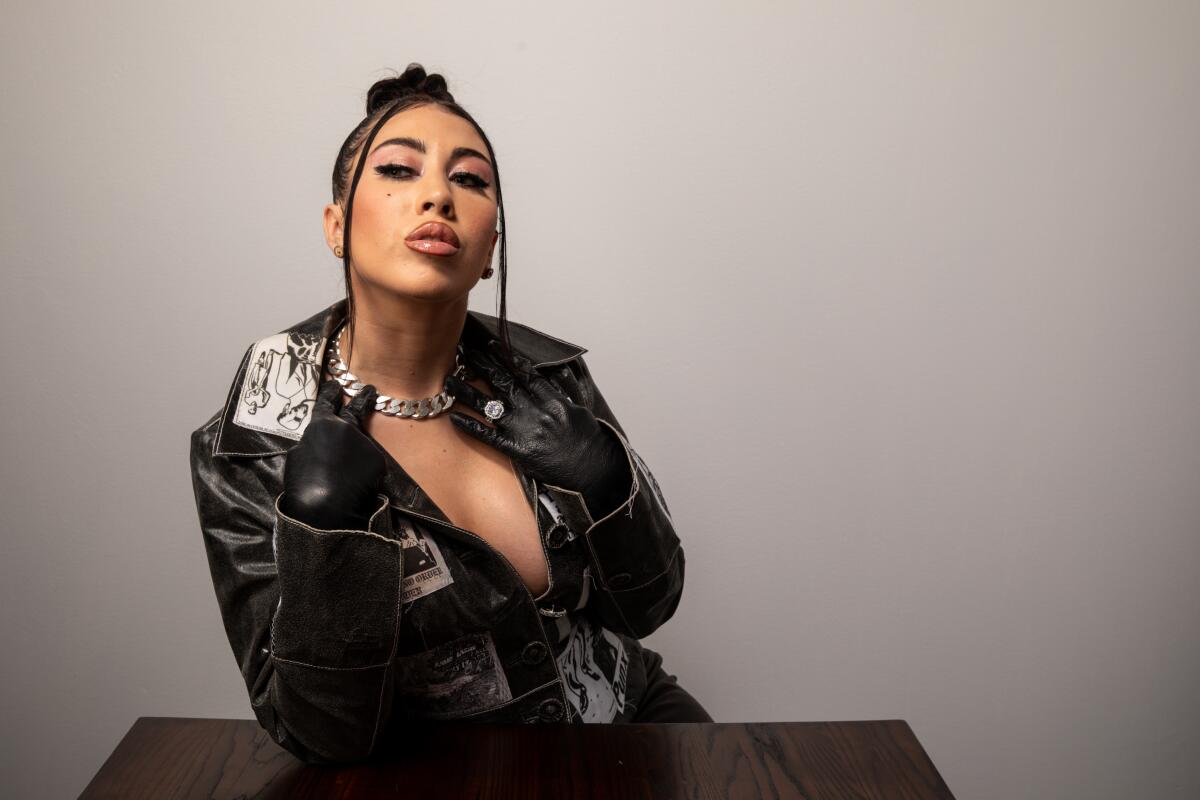A musical shapeshifter with universal ambitions, Kali Uchis aims ‘to show what Latin music can be’

- Share via
Where is home for Kali Uchis? It depends on who she feels like that day.
Once upon a time she was Karly-Marina Loaiza, the Virginia-born daughter of Colombian immigrants. After moving back and forth between the U.S. and Colombia, her family settled for a time in Alexandria, where she played saxophone in her high school jazz band and spent grueling weekends helping her parents clean homes and do construction work. But after she skipped one too many classes, she was kicked out of the house and forced to live in her car through graduation — an experience she’s described as nothing short of traumatic.
It was during the years she spent living in Pereira, a Colombian city nestled in the foothills of the Andes, that Loaiza felt she could be a more confident version of herself. Her family gave her the nickname “Kali Uchis,” a play on Karly, and it stuck.
When The Times talks to Uchis in December, the 26-year-old singer and songwriter is Zooming from her home in Valley Village, which she purchased in 2019. Fresh white walls and marble floors brighten the hue of her cherry red wig — one of the tamer pieces in her vast collection.
“I didn’t know what to do with my hair this morning,” says a typically raven-haired Uchis, fluffing her faux bangs and throwing on a sleek pair of oversized amber sunglasses. On the couch behind her sits her best friend and DJ, Angel, holding a black-and-white spotted bunny, newly christened Mumu. Ten weeks old, Mumu was a Christmas gift from Uchis’ boyfriend. “I’m calling him Mumu because he looks like a little cow,” Uchis says with a laugh. “We literally just brought him home before you called!”

Mumu is a welcome distraction for Uchis, who bemoans spending too much time scrolling through Instagram in quarantine. She’s also been rooting around her closet for looks to wear on Grammys night in January — her bubbly joint single with Kaytranada, “10%,” is nominated for dance recording. Still, she’ll most likely celebrate with a toast at home. “Back when I did my first project,” she says, “Kaytranada and Tyler, the Creator was the first people to ever send me beats. It’s definitely full circle for us.”
The news came not long after she released her 2020 sophomore album, “Sin Miedo (del Amor y Otros Demonios)∞,” or “Without Fear (of Love and Other Demons)” on Interscope and Virgin EMI. The follow-up to her well-received 2018 debut, the psych-soul opus “Isolation,” Uchis’ latest release is her first album recorded predominantly in Spanish — a risky move for a rising star in the States.
The pandemic has led to a spike in substance abuse and fatal overdoses. Among musicians, whose livelihoods have been uprooted, the problem has been acute.
Recorded partially in quarantine and delayed for several months due to COVID-19, the album came to be her safe space during the ongoing pandemic, which grounded her from what would have been her first tour of South America. An appropriately escapist work of Latin dream-pop, “Sin Miedo” is set in a rosy Venusian paradise in the cosmos, where Uchis flits about as a benevolent, breathy pop seraph.
“I just put myself in a different place,” she says of the album, “where the vocals can sound like I’m a siren, or a fairy, like some type of otherworldly creature. And I love that. It’s my dream space.”
It’s this placelessness that helped Uchis develop her rep as a human jukebox in the years since she self-released her 2012 EP, “Drunken Babble,” shrinking and expanding her voice to fit whatever kind of music she’s digging at the moment, be it bossa nova, funk, Motown. But for all her talk of the fantastical otherverse she imagined in “Sin Miedo,” the album is very much rooted in her bicultural reality: the glamorous older cousin who’s never too famous to kick back with family in the Colombian countryside, where she says she’s plotting a second home, made of recyclable materials. “I’m not one of those people who goes to Colombia and stays in a fancy hotel,” she says. “It’s important to remember where you came from.”

Much like Tejano-pop queen Selena once did by building a bridge between R&B and cumbia, Kali Uchis has built her career on hybridizing the sounds of her childhood, where doo-wop and hip-hop peacefully coexisted with reggaeton and boleros. A genre anarchist, she whips up one-of-a-kind songs that speak to a growing generation of cool kids who occupy the space between Anglo American and Latin American cultures.
Where she once collaborated with Black avant-gardists like Bootsy Collins and Tyler, the Creator, this year Uchis enlisted a cast of fellow Latinx talents: Rico Nasty riffs in English on the trap single “¡Aquí Yo Mando!” while MC Jhay Cortez appears in the soft-to-the-touch reggaeton of “La Luz (Fín).” Tainy and Albert Hype, who famously produced albums by J Balvin and Bad Bunny, assist on several tracks. Yet despite this stellar lineup, Uchis steeled herself for the challenge of translating her experience for two different music markets, where Latinos from the United States remain difficult to categorize in both English and Spanish.
“[Anglophone audiences] don’t know anything about the roots of Latin music — they think Latin music should just sound like, riki-tiki-ta!” she trills, rolling her eyes. “They think [Latinas are] beneath them, like we’re all just maids for the ‘real’ Americans. But then there are people in Latin America who say I’m not really Latina because I was born in the U.S.”
Uchis first scored some Latin music-industry accolades when “El Ratico,” her feature with Colombian rock star Juanes, was nominated for record of the year at the 2017 Latin Grammys. With “Sin Miedo,” Uchis is gunning for another shot next year. “In the Latin space it’s still like I’m a new artist, though I’ve been around a while,” she says. “There’s pressure there.”

Kali Uchis feat. Rico Nasty, “¡Aquí Yo Mando!”
Diego Ortíz, editor at Rolling Stone Colombia, says the Latin market is tough to crack for artists from the United States — especially women. “There are enough barriers for ‘agringados,’ or Americanized artists,” he says. “The Latin industry is so married to genres — they prefer strictly defined sounds. It has to be reggaeton or pop or rock. Not to mention it’s difficult for female artists, like Rosalía or Karol G, to connect with audiences here. You don’t hear women on the radio.”
“There’s so much ignorance,” says Uchis — who, apart from being a woman in the industry, is also openly bisexual. The latter has been called into question by some fans and critics alike. “[A music critic] said I kissed a girl to be trendy,” Uchis says of her video for “La Luz (Fín),” in which she makes out with her aforementioned friend, Angel.
“I’ve been bisexual my whole life. ... People are constantly trying to find something to invalidate. I want more people in the Latin community to feel like they can express themselves freely and not have to confine themselves. That’s why it was so important to me to make this album — I want to show them what Latin music can be.”
The year’s most captivating portraits. In a time of pandemic disruption, these creators made culture meaningful.
“Sin Miedo” is a bold proposal to listeners of any ethnicity, but it’s also Uchis’ love letter to the Latina foremothers who paved the way — similarly dauntless artists who were both revered and resented. Uchis pays homage to the Cuban queen of soul, La Lupe, in a smoldering rendition of her bolero with Tito Puente, “Que Te Pedí //”; and in the puro perreo track “Te Pongo Mal (Prendelo),” with veteran MCs Jowell y Randy, she calls on the feminist spirit of rapper Ivy Queen, the Puerto Rican matriarch of reggaeton. “If you are going to speak to me, speak to me with respect,” Uchis commands in Spanish.
As Uchis readies her next record, she’s been thinking a lot about fostering community, Latinx and otherwise, through her music. After a long year spent physically isolated from other people — and simultaneously drawn together through social movements like Black Lives Matter, of which she became a vocal supporter — Uchis aims for a more connected and conscious 2021, a time when she, along with many other types of Latinos, can feel more at home.
“Where can you be honored? Where can you be appreciated? Where can you be celebrated?” she asks. “We need more Afro-Latino representation. We need an industry where someone can be successful regardless of their body type, their skin color, their sexuality. We need more inclusive pop.”
More to Read
The biggest entertainment stories
Get our big stories about Hollywood, film, television, music, arts, culture and more right in your inbox as soon as they publish.
You may occasionally receive promotional content from the Los Angeles Times.











